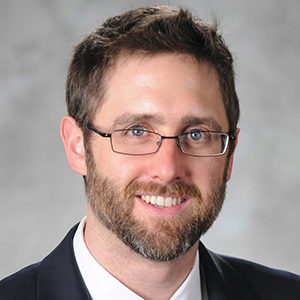The Grainger Foundation Frontiers of Engineering program has selected AE professor Marcus Holzinger for one of its two 2018 grants to support interdisciplinary collaborations.
 |
| Prof. Marcus Holzinger |
Holzinger will share the $30,000 Grainger seed grant with Prof. Katherine Davis, a Texas A&M professor whose prior work has focused on cyber-physical situational awareness (CyPSA) in power systems. Their joint work, Online Resilience Support System for Cyber-Physical Situational Awareness, will fuse two sets of expertise and methodologies -- from cyber-physical and space domains -- to investigate a hypothesis-driven decision-making process to promote grid cyber-physical resilience.
Holzinger’s prior work on space situational awareness (SSA) has established a minimum-time hypothesis-driven asset tasking and decision making process that the collaboration will further develop and test on the electrical grid.
Ultimately, their work could impact multiple domains where there is a need for accurate and immediate assessment and manipulation of assets and conditions. Space exploration is high on this list. But their immediate goal is to test the concept in the electrical grid - an infrastructure that is highly dependent on a cyber infrastructure that includes “smart” devices like relays and remote terminal units (RTUs) and a complex monitoring and control network.
"The idea is to expand it to other domains - cyber, air, maritime, and, of course, space," says Holzinger.
"This grant will give us enough research support to get preliminary results -- results that can be used not only by electrical domain operators, but the scientific community as well."
Situational awareness - knowledge of objects and activity in a defined space - provides researchers the basic information they need to predict, avoid, deter, recover from and/or explain the condition of assets within that domain. Extracting actionable data that remote operators can use in a timely way can presents a challenge – for earthbound space stations managing a deep-space voyage or a utility company assessing the condition of rural assets.
Together, Holzinger and Davis's teams will pursue a multi-disciplinary, cross-cutting approach to SA, one that emphasizes the provision of timely decision support and links SA with actions that promote resilience in cyber-physical systems. Central to this work is the incorporation of Holzinger's state-of-the-art SSA techniques, which use Judicial Evidential Reasoning (JER) to more effectively define probable problems and solutions that can be quickly executed upon by remote operators.
"A ground-breaking opportunity exists for power grid cyber-physical resilience in generalizing and applying JER methodologies to Cyber-Physical Situational Awareness (CyPSA), specifically applied to the power grid and associated cyber infrastructure," said Holzinger.
The two-year grant will allow Holzinger and Davis to support their work with graduate student researchers.
Holzinger is one of only about 100 engineers nationally deemed eligible for the Grainger Foundation grant through their participation in the 2017 Nationally Academy of Engineering's Frontiers of Engineering symposium, an annual event focused on the interests of 30-45 year-olds from industry, universities, and government labs. Holzinger is the fourth AE faculty from Georgia Tech in as many years to be invited to the symposium. Previous FOE invitees from AE include professors Julian Rimoli, Brian German, Mitchell Walker, and J.-P. Clarke. Rimoli also received a Grainger grant following his FOE participation.